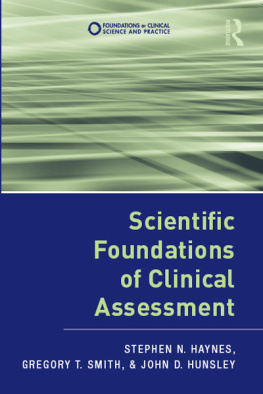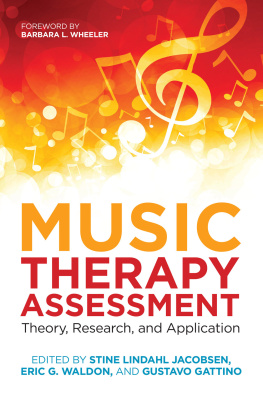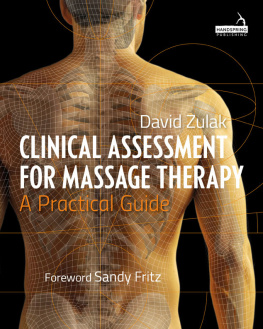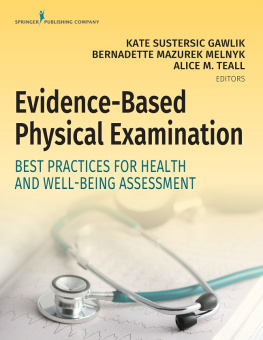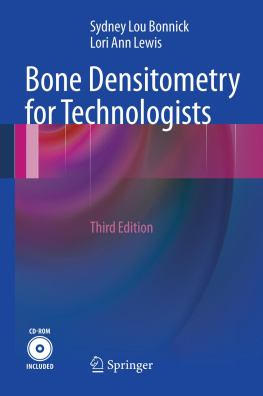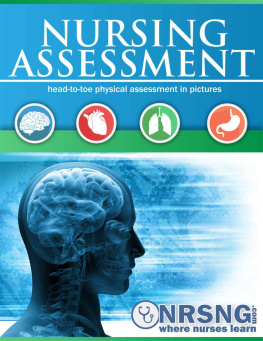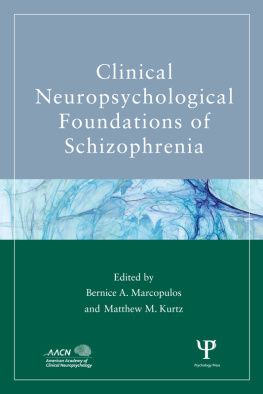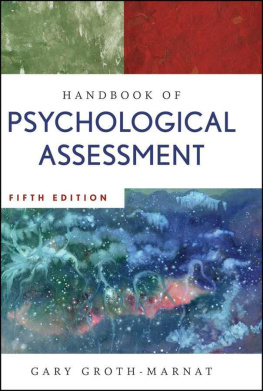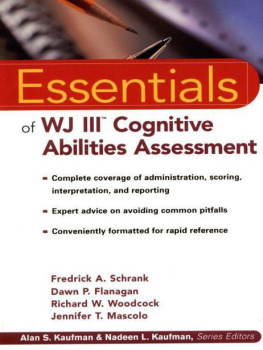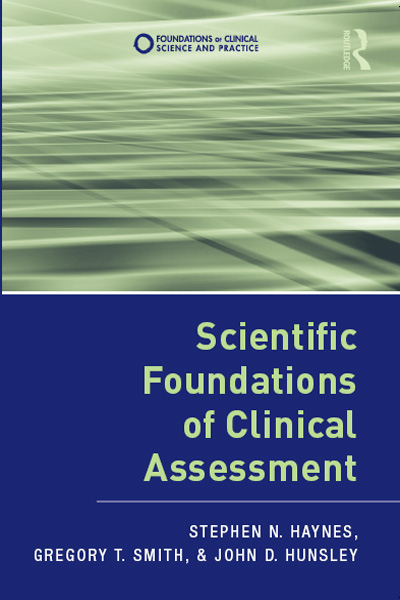STEPHEN N. HAYNES,
GREGORY T. SMITH, & JOHN D. HUNSLEY
Routledge Taylor & Francis Group 270 Madison Avenue New York, NY 10016 | Routledge Taylor & Francis Group 27 Church Road Hove, East Sussex BN3 2FA |
2011 by Taylor and Francis Group, LLC
Routledge is an imprint of Taylor & Francis Group, an Informa business
Printed in the United States of America on acid-free paper
10 9 8 7 6 5 4 3 2 1
International Standard Book Number: 978-0-415-87650-6 (Hardback) 978-0-415-87651-3 (Paperback)
For permission to photocopy or use material electronically from this work, please access www.copyright.com (http://www.copyright.com/) or contact the Copyright Clearance Center, Inc. (CCC), 222 Rosewood Drive, Danvers, MA 01923, 978-750-8400. CCC is a not-for-profit organization that provides licenses and registration for a variety of users. For organizations that have been granted a photocopy license by the CCC, a separate system of payment has been arranged.
Trademark Notice: Product or corporate names may be trademarks or registered trademarks, and are used only for identification and explanation without intent to infringe.
Library of Congress Cataloging-in-Publication Data
Haynes, Stephen N.
Scientific foundations of clinical assessment / Stephen N. Haynes, Greg Smith,
John Hunsley.
p. cm. -- (Foundations of clinical science and practice)
Includes bibliographical references and index.
ISBN 978-0-415-87650-6 (hardback) -- ISBN 978-0-415-87651-3 (paperback)
1. Psychological tests--Methodology. 2. Psychodiagnostics--Methodology. I.
Smith, Greg. II. Hunsley, John, 1959- III. Title.
BF176.H396 2011
150.28'7--dc22 2010043259
Visit the Taylor & Francis Web site at
http://www.taylorandfrancis.com
and the Routledge Web site at
http://www.routledgementalhealth.com
Dedications
To Megumi
To Di, Corey, Jamie, and Daryn
To Catherine, for her love, friendship, and support
Contents
Editors' Introduction
As the great psychologist E.L. Thorndike (1926, p. 38) wrote, If anything exists, it exists in some amount. If it exists in some amount, it can be measured. Measurement is a crucial component of science, including psychological science. Without measurement, scientific pursuits are impossible. Measurement allows us to determine the existence of entities (as the telescope revealed the existence of moons and planets and the microscope the existence of germs and cells). Measurement also allows the interested observer to capture quantity and magnitudea thermometer, for example, captures the body's temperature. Finally, as clinicians, we are interested in the measurement of changedid my client's suicidal intent decrease from the last session? In the behavioral health professions, including clinical psychology, counseling psychology, psychiatry, and social work, we measure psychological and behavioral phenomena in many different ways: we interview, we observe, we obtain information from collateral contacts, we review records, and we test. We also measure many different constructs with these methodseach diagnostic criterion in the DSM calls for a measurement (depressed mood or lost of interest or pleasure; and we also measure other meta constructs like client's motivation to change and the client's truthfulness, etc). The average clinician may need to measure hundreds of constructs to rule in or rule out different clinical conclusions.
All measurement contains error. A key question, and a question thoroughly explored in this book, is how we can reduce errors in our measurements to minimize mistaken and potentially harmful clinical conclusions. The heart of a scientific approach recognizes the error term of measurement and makes assessment decisions with this error term in mind. In this respect, a scientific approach to assessment embraces humility, as it acknowledges the ubiquity of error in our observations and inferences and the need to delineate it and if possible compensate for it. An unscientific approach, in contrast, largely ignores such error, often pretending that it either does not exist or is unimportant.
We believe that this superb book will go a long way toward remedying the measurement problems that plague our field. Too often in practice, constructs are tossed around as if they can be, or have been, measured (inner child), or are simple when they are in fact complex (best interest of the child in custody decisions). Too often, tests are administered and used to draw inferences for which there is no evidential support or when there is evidence that they actually draw error to our clinical inferences (e.g., the negative incremental validity of the Rorschach Inkblot Test in making certain clinical decisions). Much of our measurement rests on the unstructured clinical interview despite the fact that much is unknown about its psychometric properties. The present book is a remedy to these common mistakes and others.
If we as clinical scientists have expertise to sell to the public, one key component of that expertise is surely a sophisticated approach to measurement. When measurement mistakes are made, we not only fail in our professional duties but we can inadvertently harm others. The error of concluding that someone is not suicidal when he or she actually is could be fatal. Sophisticated knowledge of measurement is also a prerequisite to conducting competent research to fill in key gaps in our knowledge of mental illness and its treatment and prevention.
Professors Haynes, Smith, and Hunsley are well known scholars of psychological assessment. In this book, they provide a fascinating and user-friendly tour of the intellectual landscape of a scientific approach to clinical assessment. Their basic premise is that there is an intellectual context to clinical assessmentunfortunately assessment is not so simple that all we need to do is ask our clients to complete a test and draw accurate conclusions. One needs to understand this test's conceptual and methodological underpinnings, along with its strengths and limitations and with a keen awareness of our own strengths and limitations as information processors. The authors elegant treatment of the complexity of the intellectual context of measurement in clinical psychology allows readers to grasp this essential information in ways that are both useful and engaging.

